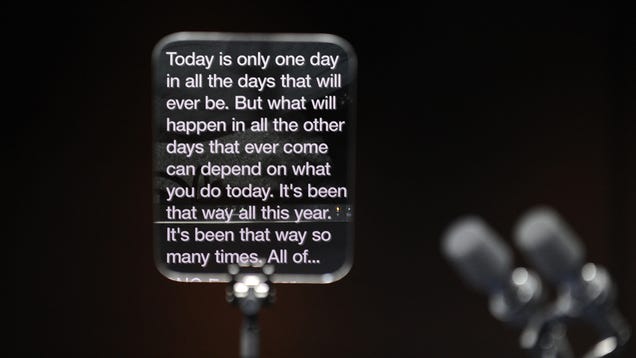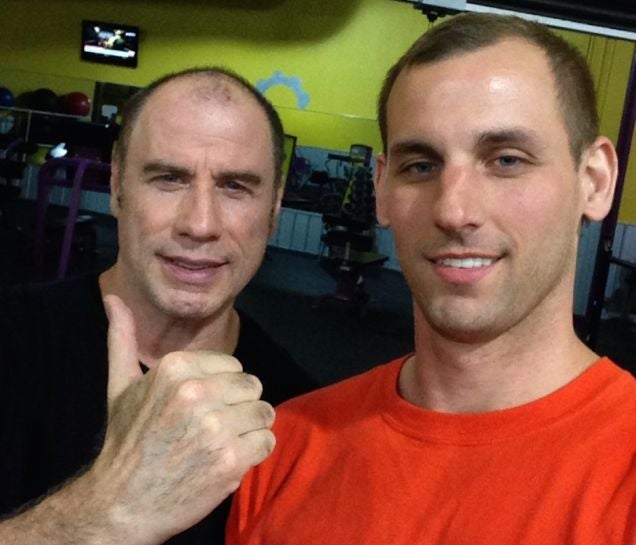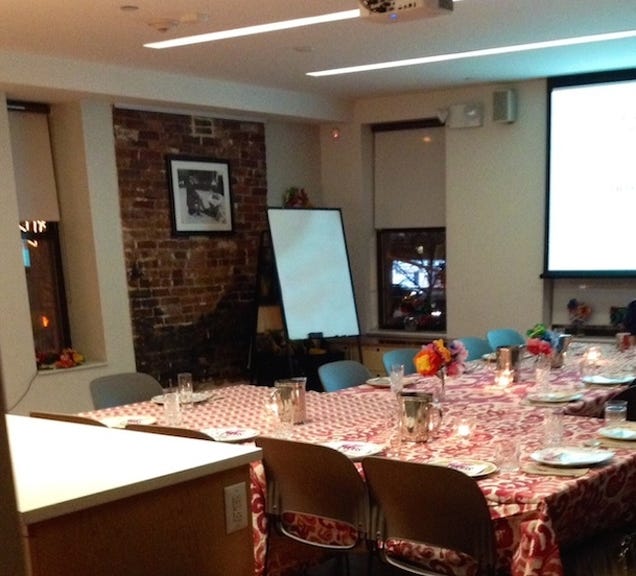![The Best Restaurant in New York Is: The Tenement Museum]()
Caity: Someone at a New Year's Eve party told me they felt we had hit a melancholy streak in our Best Restaurants lately.
Rich: Really? Was it the joy we took in watching children fall or traipsing through a toy store before it opened that conveyed sorrow?
Caity: I think also our recent observance of 9/11.
Anyway, bearing that in mind, I'm thrilled we decided to cheer things up with a trip to the Lower East Side Tenement Museum.
The best restaurant in New York is
The Lower East Side Tenement Museum's Tastings at the Tenement
Menu style
Prix fixe seven course tasting menu
Cost
Normally $35/person; a museum representative offered us complimentary media passes
Rich: For people who want to feast while thinking about New York City's bleak tenement past, the Tenement Museum offers two options: A walking tour called "Foods of the Lower East Side," and a weekly sit-down meal with a pre-set tasting menu called "Tastings at the Tenement." We opted for the latter, because it entailed less walking. Tickets for the tasting cost $35, but the museum covered ours.
Tastings at the Tenement are hosted by a museum guide. We met ours in the souvenir shop, after being instructed by PA to line-up in front of "educator Anna." I immediately scoffed at that title, only to find that we would be led for the next two hours by probably the most knowledgeable person on earth.
Caity: Anna was like the cool TA who actually teaches the professor's classes. Or maybe I'm just saying that because she's a young woman. Anna was like the cool professor who shouldn't have to prove herself just because she's a woman!
Rich: Educating the ignorant seemed like a joyous experience to her, rather than a frustrating one.
Caity: She was also beautiful. In any other town, she'd be the town model, but in New York we make her work in a tenement. Her voice was soothing—simultaneously sing-songy and deep. I sometimes forgot to pay attention to the facts she was telling us because I was so relaxed. Her speech was like the binaural beats app on my iPhone, "Pre-Sleep" setting.
Rich: She was full of fun facts—did you know that there are 700 kinds of German sausages—and endearingly formal expressions, like, "Dare I say!"
Caity: I wouldn't be surprised to learn that Anna was the ghost of a bookish young woman who died in a tenement fire two hundred years ago. I would be more surprised to learn that Anna was NOT such a being.
![The Best Restaurant in New York Is: The Tenement Museum]()
Rich: Before settling down for our tasting, Anna gave us a brief tour of one apartment in the museum, which is itself a preserved tenement building, located at 97 Orchard St. We were told not to rub against the walls, as they were made of "21 layers of wallpaper, 10 layers of paint, and horse hair." Frankly that sounds more stable than any wall that I've rubbed up against in recent memory.But fine, I thought. I'll listen.
And then, immediately, I rubbed up against a wall.
Caity: Oh my God, really?
Rich: I tried to tell you with my eyes.
Caity: I'm so glad I didn't make eye contact with someone who broke the rule.
Anna, I did NOT rub up against the wall. I respect your former home. And forever home.
Rich: We entered the apartment and were immediately quizzed.
Caity: "This was my room—" said Anna. "—I MEAN...What can we say about the people who might have lived here?"
Rich: "What are your initial reactions to this home? What questions do you have?"
Caity: My initial reaction was JEWS because there was something written in Hebrew on the wall, but no one else said that, and I didn't want the other people in our tour group to think that all I had to say about the apartment was that the people who used to live in it were Jews.
Anyway, that was the only thing I noticed about the apartment.
Rich: My initial reaction was "It looks like Brooklyn." I have been in many buildings that look pretty much exactly like the tenement, no TV and all.
Caity: I agree that at first it didn't seem that much worse than my or my friends' apartments...until we were informed that a family of EIGHT had lived there. (The Rogarshevskys.) (Jewish.)
Rich: Some people slept with their heads on the couch and their legs propped on boxes. They even took in boarders sometimes.
Caity: Like Anna.
Rich: We were told to consider the solitude of Fannie Rogarshevsky, which sounds like a Belle & Sebastian song. Anna used the terms "air shaft" and "fire door," which made me think of Ani DiFranco. The whole experience gave me flashbacks to my freshman year in college, when I, a poor immigrant from Jersey, came to live in New York. Culture is cyclical.
Fun fact: "tenement building" just describes a multi-family building, but the term came to have such a negative connotation that new builders switched to the euphemism "apartment". Technically, Donald Trump lives in a tenement building — another bit of wisdom from Anna.
Caity: Another interesting thing Anna mentioned about the building at 97 Orchard is that it was condemned in the 1930s because it was not fire-safe. Floors two through five were boarded up (commercial spaces in the basement were left open), and then one family just sat on the building from 1935 through 1988, when the museum took it over.
Rich: Being instilled with the fear that we could die at any moment standing in that tenement building really gave the tour an uncommonly immersive quality.
Caity: After Anna showed us her home and impressed upon us her ghostly message of fire safety, it was time to return to the museum's other building, where touching the walls is allowed, presumably, but not outright encouraged.
We walked up a flight of stairs, and then she led us to the homiest conference room in New York City. The tables in front of the PowerPoint presentation were decorated with cloths, paper flowers, charmingly mismatched old world plates, and candles—their flames' brazen jig reflected back to us in Anna's dark eyes.
![The Best Restaurant in New York Is: The Tenement Museum]()
There, Anna introduced us to a woman named Elana, who would be plying us with food and booze for the next ninety minutes.
Rich: We sat amongst five other couplings. I was convinced that the women on my right were lesbians. They had short hair and one drank beer. Nope. Mother/daughter.
Caity: Wait—they weren't mother/daughter. They were friends.
Rich: No, they were definitely mother/daughter.
Caity: I thought one's daughter bought her the tickets. Are you sure?
Rich: OHHHHHH.
Caity: Rich, they were like the same age.
![The Best Restaurant in New York Is: The Tenement Museum]()
Rich: I thought that too! But one had grayer hair! So I just figured "Oh, she must have had her very young" OK, so they were lesbians.
At the other end of the table, the presumed homosexual daddy/son couple ended up being...an actual father and son. I mean, I was SURE that they were gay. And perhaps they are. My mind got blown a lot that night.
There was also a decidedly mixed-gender ACTUAL couple. The woman looked like Lena Dunham and the man looked like Nate Silver. IMAGINE THAT.
Caity: I loved the other mixed gender (engaged) couple, who were there because the man LOVES the Tenement Museum and the woman had never taken part in one of these tastings. If you can believe it, this couple was conventionally attractive, and not outwardly strange. Just two good-looking people who really enjoy the Tenement Museum.
Rich: After taking our seats, we were made to go around the table and explain why we were there, which was like: MOMENT OF TRUTH.
I had to go before you.
Caity: Here, I assumed Rich would say "I write a restaurant review column for a website." But instead he made up some bullshit lie about loving history.
Rich: Should I reveal our true intentions or continue to look like an insane person who just likes to take notes on things?
I chose the latter. "I'm generally interested in New York history." Not a lie. Not the truth.
Caity: People always ask me, What's Rich like in real life?
"Generally interested in New York history," is the reply.
Meanwhile, I had actually recently watched two documentaries on topics relating to this chapter of New York history (one about the Triangle Shirtwaist Factory fire, another on the construction of Penn Station) and I could not think of anything to say.
Rich: I think I took your answer. You seem generally interested in New York history.
Given that we were invited by a Tenement Museum employee, I think Anna must have known our true purpose there and it's testament to her character that she didn't doxx us.
Caity: I was panicking that Anna would think we were weird for lying, so I just made up a bizarre long answer that didn't make sense. I rambled for eleven hours about everything and nothing.
....and speaking of New York Harbor, you may be saying to yourself, "Hey, the Statue of Liberty is made of copper like a penny so why isn't it brown like a penny?" Here's my guess:...
Eventually I had to stop talking because it was time for the birth of my first great-grandchild.
Rich: Honestly, I just didn't want to compromise the integrity of our shared meal. I wanted people to be "natural" without feeling like they were being documented
Caity: Little did they know you were taking notes on all of them. "Gay," you wrote "He's gay. He's gay. They're gay together. Gay."
Much better for everyone to find out what you were writing down now, by surprise.
Rich: This surreptitiousness ultimately led to me feeling like an asshole for taking a picture of every single thing that was put on my plate. If you're doing that for work, well, you look like LESS of an asshole.
Caity: We're foodies and we love these little pretzel parts.
Rich: I really wanted to be like, "I'm not one of those people! I promise I'm doing this for a reason." But, I guess ultimately, job or no job, I AM one of those people.
Caity: After we learned why everyone was there (turns out most people have a general interest in New York history), it was time for the bacchanal to begin. Elana had given us all wine or beer of our choosing.
Rich: I chose beer so as to look butch. Lots of covers to refrain from blowing that night.
Caity: I chose white wine so people would think I was there filming a scene for The Real Housewives of New York, which I'm sure is one of the lies I told in my rambling explanation of why I was there.
Rich: I was so hungry that I immediately got drunk on the beer. I felt like Lita Ford.
Caity: Everything we were served came from a represented a specific immigrant group and chapter of the Lower East Side's tenement history. The food is all procured from neighborhood businesses. The first thing Elana placed in front of us was PRETZEL PIECES numnumnumnumnumnum.
![The Best Restaurant in New York Is: The Tenement Museum]()
Rich: They were wonderful and the accompanying sauces were even more wonderful, BUT I got very small pieces! I got the slim internal connectors, not the fat hunks that make the perimeter.
Caity: This is not going to make sense to anyone reading but Rich would not stop WHISPERING to me about it so I guess I'll leave it in.
Rich: I was so hungry! It felt like a loss. I'm a big guy! I need big pretzel bites! Why didn't Elana tend to my needs? If I saw me, I would think "He has a big body and must need more food to be full than most people. I'll make sure to give him the most."
Caity: Elana did the right thing by giving me the most, because I eat the most and I CERTAINLY love pretzels the most. They reminded me of my homeland, Harrisburg, Pretzelvania.
The pretzels were accompanied by mustard and a spicy cheese spread called "liptauer," both of which I ate like a pretzel, in that I ate them alone, after all the pretzel was used up. We were also given baby portions of German potato salad, which was delicious. Anna explained that the first immigrants to settle that neighborhood were German, a fact of which even we—two people with a general interest in New York history—were not previously aware. She pointed out that these foods were the kind the owners of Schenider's saloon, which opened there in 1864, might have eaten, pretending not to have vivid, specific memories of sitting around the table with the Schneiders, eating dinner with them, and telling them about her day.
Rich: It was almost maddening how good the food was. We were given such small portions, in a trickle. A kind of Chinese water torture for your stomach. I was so hungry I wanted to lick the plate.
During the next course, we were given a fantastic pickled pineapple, which tasted of cloves, and a pickled green tomato, which tasted like cheese. Included in the trio: good old fashioned pickled cucumber.
![The Best Restaurant in New York Is: The Tenement Museum]()
Everyone else also got two pickled cucumber pieces but I just got one.
Caity: Wow, Rich, you basically lived in a tenement for 7 minutes.
Rich: Again, it was an immersive experience. Did I like suffering? No. Do I understand what it was like to go to a tasting at the turn of the 20th century? Absolutely.
Caity: A true taste of the tenement would have been serving us nothing, but it would be ballsy to charge people $35 for the taste of hunger.
![The Best Restaurant in New York Is: The Tenement Museum]()
Rich: For our third course, we visited the Italian immigrant population via Soppressata wrapped around a piece of Parmesan, a slice of prosciutto, and an olive. No wait—we got two olives but I was so hungry that I ate one before I took my picture.
Caity: Your vegetarianism was accommodated by the removal of the meats. I can't believe you revealed that truth about yourself to the group. The only true thing you said all night.
Rich: It was the hardest thing I've ever done. It really did make me feel like even MORE of an asshole.
Caity: Me? My name's Candybar. I have a general interest in New York history and I'm 16 years old. Wandered in here looking for my aunt—she works here, and, uh...
Rich: I'm taking pictures of my food because it's just something I like to do. And...I'm a vegetarian.
Anyway, I hate letting people know that. Feels like it gives them some power. Enough about me, the olive and cheese were great, no complaints.
Caity: One thing that struck me as a little odd, but which I suppose was unavoidable: Everyone was given given a nice ceramic plate to mark their place at the table, but all the food was served on biodegradable cardboard plates that were placed on top of the pretty plates. I guess it would have been clunky for Elana to lug around serving dishes, or scoop up all the plates every time, but it did make it feel a little like we were in a plate museum, pretending to use plates but not touching them.
Rich: Some tenants don't have any plates, and there you are complaining about having too many.
Caity: Our fourth course was cheddar cheese, queso blanco with guava paste, and maduros. This was representative of the time Rosie Perez lived in the Lower East Side Tenement Museum.
![The Best Restaurant in New York Is: The Tenement Museum]()
Rich: I love love love guava and cheese combos. Almost as I love platanos. I love my food like I love my men: Latin.
Caity: I prefer my food without paste on it but, of course, no amount of paste will stop me from ultimately eating it.
Rich: I want gobs of paste on my tongue, as long as it's Latin paste.
Caity: Everything was, in keeping with the theme of the night, delicious. I do think the small portions, coupled with Anna's history powerpoint interludes, made me really savor every bite.
Rich: I agree. I usually wolf, and this time I nibbled. It almost worked in satiating me. It made me feel fortunate to have anything in my mouth at all.
Caity: I would have eaten the cardboard plates if Elana had not collected them so efficiently (always from the right, and served from the left). Our fifth course was the most plentiful: peanut noodles. A mountain of peanut noodles. Peanut noodles spread across our plates like amber waves of grain.
![The Best Restaurant in New York Is: The Tenement Museum]()
Rich: They were greasy, which is not a bad thing to be. I prefer sesame noodles, but these were good.
Caity: The peanut noodles would have been my least favorite dish of the evening, except that there were so many of them. (As it was: I guess I have only favorites?) It was the only thing that came close to approaching my standard portion size. I was grateful for that. Grateful for peanuts, even in the form of noodles.
Rich: Right there with you. It also opened a conversation about Chinese-American food and authenticity, which I took part in.
Caity: What is a peanut noodle? Is it made of peanuts?
Rich: Nah, it's the sauce that has the noodles.
Caity: I thought they were made of peanuts. Less impressed now. Not very innovative to make a noodle not out of peanuts.
Rich: Seems impossible, but when you're you, you have the right to demand the best.
Caity: I was SO IMPRESSED someone had found a way to do that. What's next? Computer made out of peanuts? Song made out of peanuts?
Rich: The woman next to me talked about a wedding she went to where they served authentic Chinese food, including jellyfish tentacles. They were "kind of rubbery," according to her. Good to know.
Caity: Were the jellyfish made out of peanuts?
Rich: Nah, they were made out of sesame.
Caity: Not. Interested.
At this point in the meal. I was wondering if we were ever going to get something really substantial. The noodles were our first warm dish, but I had a taste for meat.
Elana heard my internal wonders, and next, brought out plates of fried pork-and-chive dumplings and boiled vegetable dumplings. She gave you double vegetable dumplings which was the worst thing that ever happened to me. I could have had your meat, and you could have had my peanuts, or whatever the vegetable dumplings were made of.
Rich: You'll never have my meat! I forgot to take pictures of the dumplings altogether.
Caity: Oh, man, I did too! We were so hungry, we forgot to take pictures of the best thing!
Rich: Haha, well, imagine dumplings, readers.
Caity: Imagine, if you will, two enormous peanuts.
They looked basically like this: O O
Rich: Here, I'll draw a picture.
![The Best Restaurant in New York Is: The Tenement Museum]()
Caity: There they are. Anyway: As you can see, they were delicious.
Rich: It is a compliment NOT to be photographed.
Caity: Our seventh course consisted of a trio of desserts: a black sesame cream puff, a chocolate-covered pretzel, and halvah. The cream puff was phenomenal.
![The Best Restaurant in New York Is: The Tenement Museum]()
Rich: Cream puffs generally are. I have a general interest in eating cream puffs.
Caity: Black sesame sounds like something that would ruin a cream puff, but it made it great.
A fellow diner expressed concern that Anna had not partaken of any dishes, which is a very rude thing to say to a ghost. "I'll eat later, don't you worry!" lied Anna.
Rich: Also, Anna's mug was mysteriously full of something.
Caity: Air.
Rich: As for the rest of the dessert: all good. I love chocolate covered pretzels. I love cream puffs. I love that creamy smear of whatever. Also, I was still very hungry after. This tasting fed my head but not my stomach.
Caity: We clapped for Anna, and for innovative peanut technology, and for tenements, and then set out into the night to purchase a second order of dumplings from the restaurant that provided the first (Vanessa's). The tasting made us better, more involved community members. Also peckish.
Is Everything OK?
Questions About the Dining Experience
Would you go back?
Caity: I would go back in a heartbeat. I plan to revisit the museum itself, which we we didn't get to spend much time in. I would absolutely re-do Tastings at the Tenement if a friend wanted to. Maybe a few years from now I'll be the insane man dragging my future bride to an evening of small snacks. I LOVE the Tenement Museum and she's never been to the tasting.
Rich: Even though I learned a lot and leave the Tenement Museum a changed man, I bet we didn't get a hundredth of Anna's knowledge, so I feel like going back would provide more food for thought and more food to be tantalized by until we eat a real meal at Vanessa's Dumplings. The real solution is to go to the Tenement Museum on a full-ish stomach. Modern society compels it.
Is it a good first date spot?
Caity: It is almost a perfect first date spot, except that Anna, God love her and one day free her from this earthly realm, kept asking us enthusiastic substitute teacher-like questions, which were always greeted with a few seconds of uncomfortable silence. If she were allowed to simply produce information without involving us, it would be a great first date spot.
Rich: It's about as good of a first date as a movie in that you won't really get to talk to your date very much, but you'll both exist quietly, listening. The good news is that you won't fill up on food, which makes sex a more plausible outcome (especially of the anal variety). (In my old age, I have come to be less interested in sex on a full stomach.)
Is it a good place to have an affair?
Caity: The great thing about Tastings at the Tenement is that once you get there, you can totally reinvent yourself and be anyone you want to be. It's a little like the Big Apple itself that way. Maybe you and your mistress are doctors from Switzerland. Maybe you have a general interest in New York history.
Rich: Yes, this is a wonderful place to have an affair with your parent.
Is it a good place to bring a doll?
Caity: This is a great place to bring a doll, because the portions will be just what she is used to.
Rich: Did you make your doll out of a dirty washcloth and some raisins stuck to it for eyes? No? Then leave her home and don't expose her to the old timey squalor. There's no reason to give her bad dreams.
There are a bunch of restaurants in the world, including some in New York City. But in a city of over 24,000 restaurants, how do you find the best? You begin your search in places that are already popular: New York's hottest tourist destinations. In The Best Restaurant in New York Is, writers Caity Weaver and Rich Juzwiak attempt to determine the best restaurant in New York.
Previously: The Best Restaurant in New York Is: The Best Restaurant in New York Is: FAO Schwarz; The Rockefeller Center Ice Rink; The 9/11 Memorial & Museum Café; The Empire State Building; The Macy's Basement; Wall Street Bath & Spa; El Museo del Barrio; The Williamsburg Urban Outfitters ; The Central Park Boathouse; The Tommy Bahama Store; The Bronx Zoo; The Armani Store;The Crown Cafe at the Statue of Liberty; The Campbell Apartment inside Grand Central; The U.N. Delegates Dining Room; Play at the Museum of Sex; Le Train Bleu inside Bloomingdales; LOX at The Jewish Museum; The American Girl Café
[Top photo and museum exterior shot courtesy of The Lower East Side Tenement Museum / Other images by Rich Juzwiak and Caity Weaver]



















































